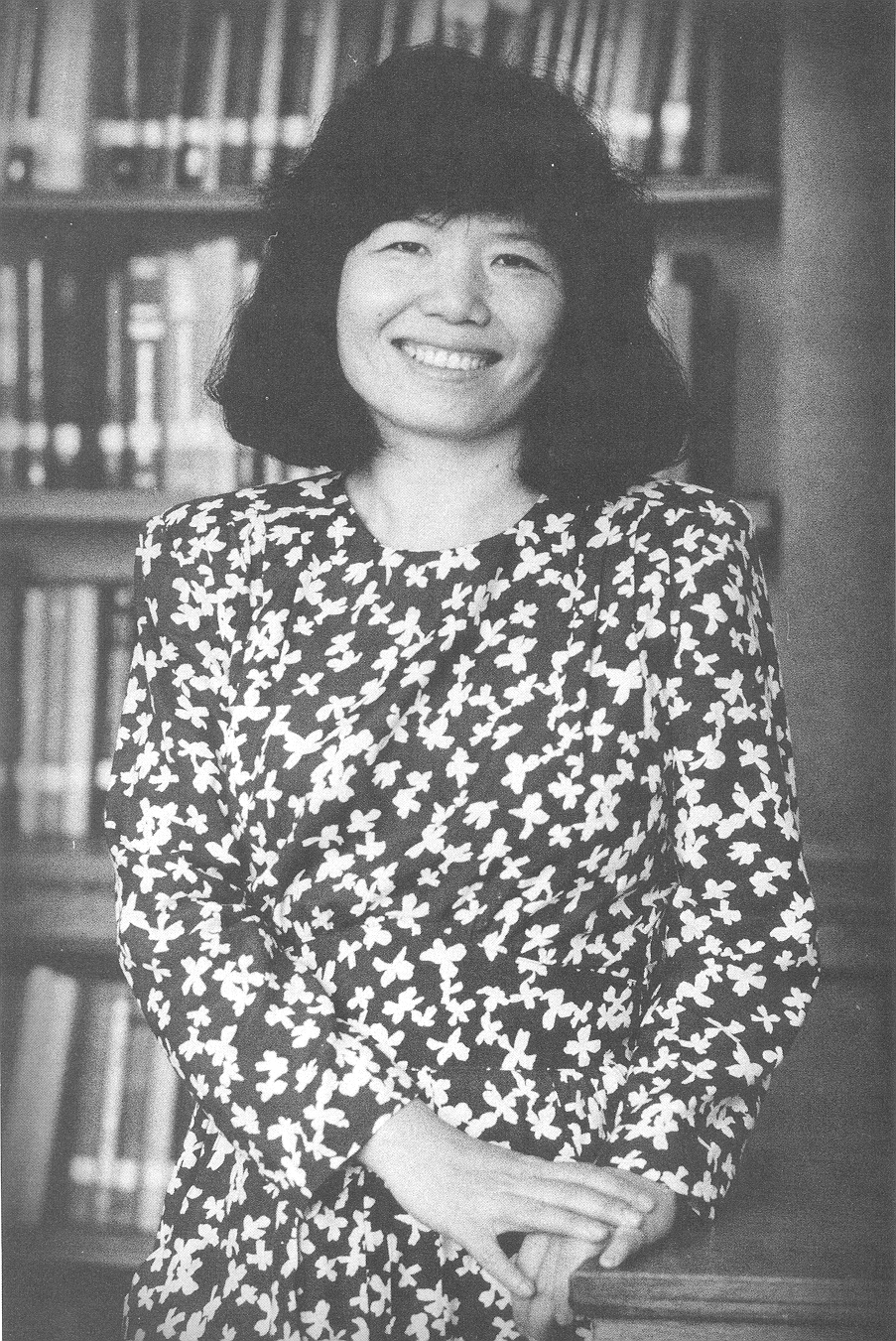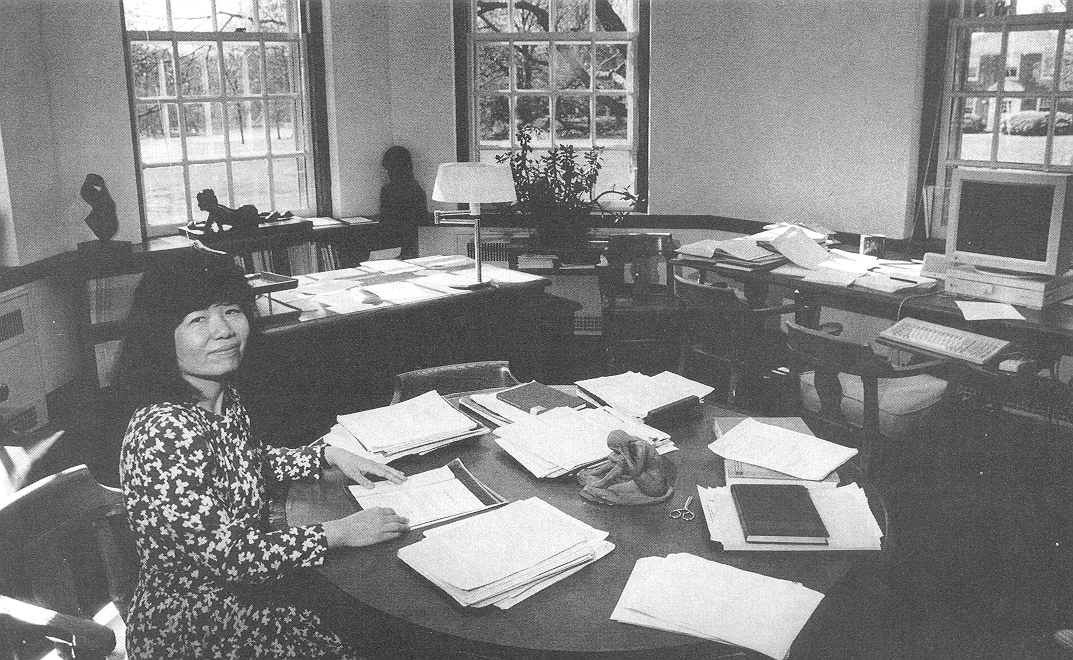
 "Don't be intimidated!" is Dr. Fan Chung's advice to young
women considering careers in mathematics. "I have seen many
people get discouraged because they see mathematics as full
of deep incomprehensible theories. There is no reason to feel
that way. In mathematics whatever you learn is yours
and you build it up -- one step at a time. It's not
like a real time game of winning and losing. You win
if you are benefitted from the power, rigor and beauty
of mathematics. It is a big win if
you discover a new principle or solve a tough problem."
"Don't be intimidated!" is Dr. Fan Chung's advice to young
women considering careers in mathematics. "I have seen many
people get discouraged because they see mathematics as full
of deep incomprehensible theories. There is no reason to feel
that way. In mathematics whatever you learn is yours
and you build it up -- one step at a time. It's not
like a real time game of winning and losing. You win
if you are benefitted from the power, rigor and beauty
of mathematics. It is a big win if
you discover a new principle or solve a tough problem."
Chung regards herself as being luckier than many mathematicians. "As an undergraduate in Taiwan, I was surrounded by good friends and many women mathematicians. We enjoyed talking about mathematics and helping each other. A large part of education is learning from your peers, not just the professors. Seeing other women perform well is a great confidence builder, too!" Following that logic, Fan must have built up the confidence of many other women, for she has performed extremely well as a student and researcher.
As a young high school student growing up in Kaoshiung, Taiwan in the sixties, Fan Chung knew that she would be a mathematician. Her engineer-father told her, "in math all you need is pencil and paper." Attracted to combinatorics because it was fun, Chung recalls that "many problems from combinatorics were easily explained, you could get into them quickly, but getting out was often very hard ...Later on I discovered that there were all sorts of connections to other branches of mathematics as well as to many applications."
After twenty years of work at Bell Labs and Bellcore, which contributed powerfully to her mathematical world view, Chung went back to school as professor of mathematics at the University of Pennsylvania, where she had earned her doctorate in 1974.

She is convinced that students profit enormously from establishing connections among different branches of mathematics "It is like playing a game of GO (or HEX). If your territory is all connected together, then every piece is strong and useful. On the other hand, if the parts are separated, then they are weak and not effective." She aims to make them aware of the power of connections and applications. "If you learn lots of theorems without actually using them, it is like a rich man who never spends his money. There is no difference between that and having no money at all." She believes that mathematics students are short-changed if they aren't exposed to such connections during their college years. She argues that such experience will make them more employable--better researchers and better teachers.
Chung's appreciation for making connections dramatically increased when she started working in information technology in 1974. With her new doctorate in hand, she joined the technical staff of Bell Labs, which was richly populated with research scientists and mathematicians, including Nobel Prize winners. She remembers being intimidated by "all of those great name tags"---Pollak, Graham, Sloane, etc.---during her first days on the job. "But I got over it," she said, "and very soon I discovered that if you just put your hands out in the hallway, you'd catch a problem."
How did Fan Chung "catch problems in the hallway"? She says that the hardest part was establishing communication. "At Bell, our office door is always open and anyone can walk in," she recalled. "You need to have a willingness to find out what problems they are working on. Finding the right problem is often the main part of the work in establishing the connection. Frequently a good problem from someone else will give you a push in the right direction and the next thing you know you have another good problem. You make mathematical friends and share the fun!" Over the past twenty years, she has been remarkably successful working with others. Nearly half of her 180 papers have been done collaboratively.

Dr. Chung has a good nose for problems. She contrasted the differences between math noses and physics noses. "In physics there are clearly defined central problems, driven by our desire to understand the universe in which we live. Thus physicists have a clear notion of judging what the important problems are. In mathematics, by contrast, you can create your own paradigm and that can be wonderful. You can make your own rules and play your own game in small universes here and there."
She warns of dangers to be found in smaller free wheeling mathematical universes. "Because of the a large number of mathematical papers published each year (around 50,000), it is not easy to separate the wheat from the chaff. This makes it harder to determine the central problems." Chung claims that seeing a problem occur in several different settings and in different guises is key to identifying central problems.
Other keys to Chung's success in catching problems can be found in her enormous energy and determination. She says that "mathematics is on my mind all the time, sometimes even in the middle of the night." As a measure of her energy, consider her approach to raising a family. She had her first child during her last year of graduate school. "That is a wonderful time to have a child," she said. "You don't have to attend classes; you only have to write your thesis." After working at Bell Labs for only three years, she was pregnant again. Henry Pollak, her manager, wondered what she would do.
"I told him that I would work until the day I went to the hospital. Since I already had one at home, I thought what's the problem with one more? I didn't even take maternity leave; there was too much paperwork associated with that. So I just took four weeks vacation and wrote one paper in between."
In 1983, after the divestiture of Bell Telephone came the creation of several "Baby Bells" and Bellcore as well as a new research unit within Bellcore headed by Pollak. He asked Chung to work with him in developing a new mathematics research group at Bellcore. She became a manager, and recruited mathematicians "For the next seven years, in addition to my research, I had to write reports, attend meetings, and read the research papers of mathematicians I supervised," she said. When she first arrived at Bell Labs and wrote her first paper under Pollak, she discovered something important. "It was absolutely clear that he was reading my paper with care," she said. "I really appreciate what he's done for my papers and for the example he set. Without Henry, I would not have done as well as I did when I became a manager."
Many year later, when Chung told Pollak that her first paper was rewritten eight times, Pollak replied that his first paper had been revised twenty-four times. It's clear that the approaches to writing and reading at Bell are different than those found in many mathematics departments. It's no surprise Chung believes that both faculty and students would profit greatly from increased attention to writing and reading.
It was also at Bell that Fan Chung met her second husband mathematician, Ron Graham. She says that they do, in fact, 'talk shop', at home --- a lot. "Mathematics is an unlimited source of adventures. It is quite wonderful to have your better half stand by you through the up's-and-down's of your journey."
In 1990, Fan went to Harvard on her leave as one of the first Bellcore Fellows. "It is not easy for some people to leave management, but it was not so hard for me," she said. "Usually with positions in management you obtain more influence and you certainly have more power to make decisions. But I do not want people to respect me because of that power. I'd rather win their admiration because of the mathematics I'm doing."
At Harvard---using her tested method of catching problems--- she continued making connections with new mathematicians and new mathematics. "The interaction of combinatorics and other areas of mathematics opens up many exciting directions. It is like opening an old treasure box at the same time as you find modern power tools. So you have precious crystals in one hand; a laser gun in another, and the light can go much further."
Her work as a visiting professor at Harvard was so stimulating that she decided to return to academe, and in 1994 she accepted an offer of an endowed professorship at the University of Pennsylvania. But Professor Chung is deeply concerned about academic mathematics, in particular what she calls the "cloning process."
"Professors train students to work in their areas and thus there is a danger of narrowing down instead of broadening and making connections with the new information technologies and other emerging areas of mathematics," she said. "In most of our universities, the mathematics curriculum has changed very little over the past twenty years. It's comfortable, to teach what has been taught for twenty years, but look at the progress of technology during that same time frame. Of course, mathematical principles are unchanged. However, there has been significant growth in particular in discrete mathematics. Mathematics is more important than ever in dealing with all the hard problems arising from the advances of technology."
"There are many wonderful ideas from discrete mathematics that students need to know about. Because we live in the information age, many challenging problems arise in our binary universe. It is essential for the students to be able to connect the mathematics you learn in the classroom to problems we face in this information age! "
In spite of spending most of her professional life working in an application environment, Chung says that a large part of her drive to solve problems comes from the beauty of mathematics. She says that "the dividing line in mathematics is not 'pure' versus 'applied'; it is 'good' versus 'bad.'" Good mathematics, according to Dr. Chung, is characterized by its impact. "Bad mathematics is cooked up artificially, perhaps in isolation, and it will vanish from view very quickly."